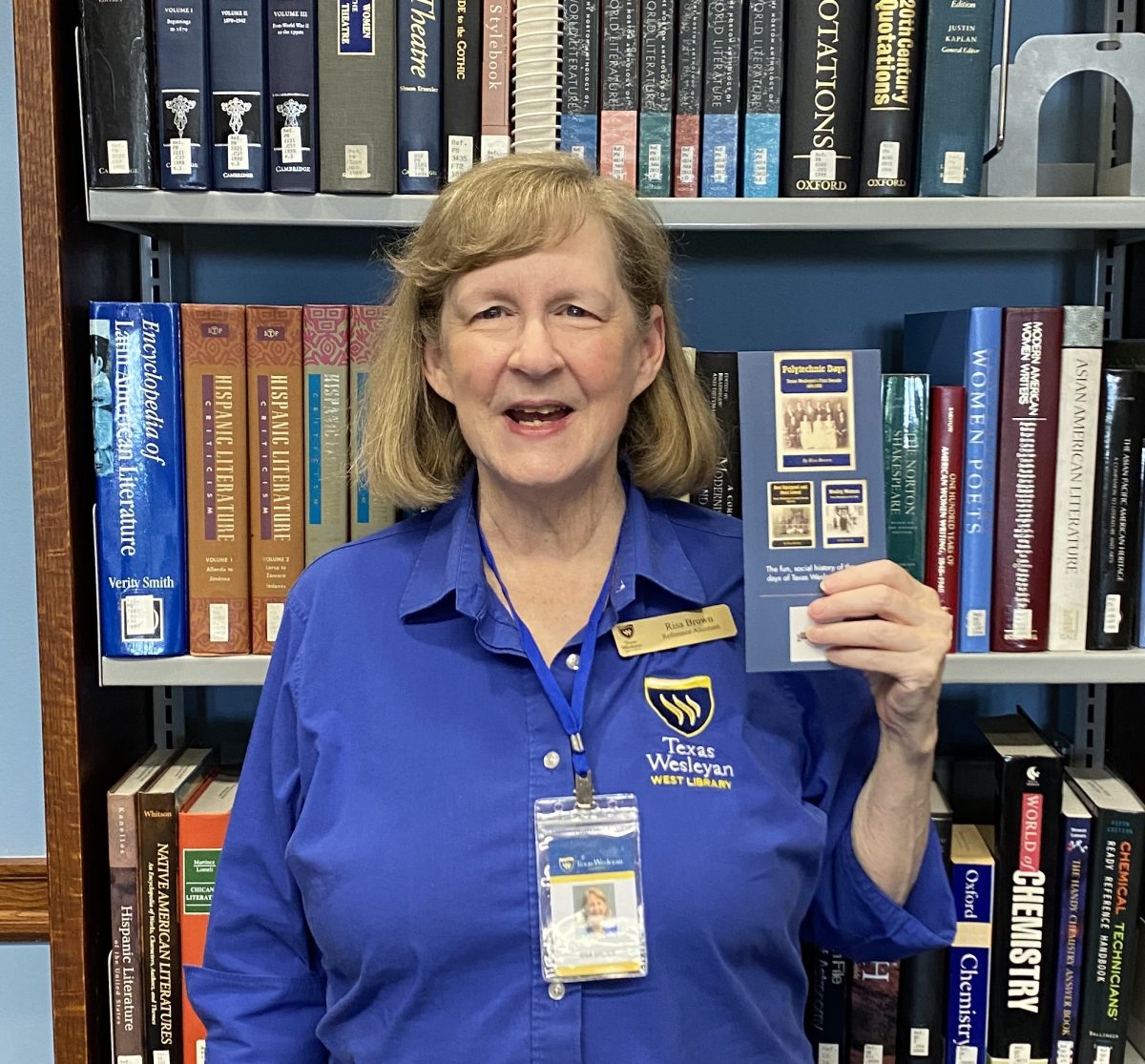Texas Wesleyan University’s early years come to life in Polytechnic Days: Texas Wesleyan’s Third Decade, 1910-1920, the latest book by West Library reference assistant Risa Brown, set to release next week. The book, part of a historical series published by alumnus Perry Cockerell, offers a rich, narrative-driven look at the university’s evolution through the experiences of its students and faculty.
The series was born from Cockerell’s vision for a meaningful exploration of Texas Wesleyan’s legacy. He first proposed the idea to Brown, who has since completed volumes on each decade of the university’s early history.
“I wanted to capture more than just dates and milestones,” Cockerell said. “These books focus on the students and faculty who shaped Texas Wesleyan’s identity. Their stories add heart and meaning, showing the resilience that has carried the university forward.”
The third volume focuses on the transformative decade when Texas Wesleyan transitioned to an all-woman’s college and adapted to the upheavals of World War I and the Spanish flu pandemic. Brown identified adaptability as the core theme of this era, especially as young women stepped into new roles and redefined the campus community.
“This era was a turning point, not just for Texas Wesleyan but for women across the country,” Brown said. “The young women here were not simply students; they were pioneers, pushing boundaries and creating a legacy of empowerment.”
Brown’s research drew heavily on resources from the Special Collections Department, which holds yearbooks, student newspapers, and photographs from the university’s past. Collaborating closely with archivist Louis Sherwood, Brown found invaluable materials that illuminated the student experience of the early 20th century.
“The Special Collections Department was invaluable,” Brown said. “Each new discovery brought the past to life, adding layers to Texas Wesleyan’s story.”
Sherwood, who provided archival expertise and support, emphasized the importance of preserving these historical materials.
“We have a responsibility to safeguard these pieces,” he said. “Some records are fragile and rare, and they carry voices that deserve to be heard by future generations. Our work is really about connecting the past to the present, so these stories can inspire and inform the next generation.”
As she progressed through her research, Brown found increasingly rich sources, including oral histories that provided personal perspectives and shed light on the cultural shifts of the time.
“The oral histories transformed historical events into lived experiences,” she said. “They allowed me to hear the voices of those who were part of Texas Wesleyan’s story, adding depth and color that you can’t capture in written records alone. It was like meeting the students and faculty from over a century ago.”
Amy Tate-Almy, from Texas Wesleyan’s alumni department, highlighted the book’s unique significance for the university’s alumni.
“Our alumni cherish these stories,” she said. “The book allows them to reconnect with their alma mater and see themselves as part of a legacy that’s still unfolding. It bridges generations, bringing together past and present.”
Tate-Almy said the alumni office is excited about the impact of the series, especially as more alumni reconnect with Texas Wesleyan’s historical roots through each book release.
“We’re thrilled to see alumni reconnecting with Texas Wesleyan’s roots through this series,” Tate-Almy said. “Each book release brings more interest, and it’s inspiring to watch graduates find a renewed sense of pride and connection to the university’s history.”
Cockerell views the series as a lasting tribute to the Texas Wesleyan community, inspiring alumni, current students, and faculty alike.
“This series is not just for history buffs,” he said. “It’s for everyone who values Texas Wesleyan’s role in their life. I hope these books foster pride and a sense of continuity for all who are part of this place. Every decade we explore is another chapter in a story that’s far from over.”
With plans to continue exploring additional decades, including a potential focus on the 1960s, Brown and Cockerell’s work on Texas Wesleyan’s history is far from complete. For Brown, each volume deepens her appreciation for the university’s history.
“Working on this book made me fall in love with Texas Wesleyan,” she shared. “It’s more than just a project; it’s a way to help others appreciate the legacy that’s been built here.”
Polytechnic Days: Texas Wesleyan’s Third Decade, 1910-1920 will be available at West Library next week, inviting readers to engage with the resilience, adaptability, and achievements of Texas Wesleyan’s early community and the stories that have become part of its enduring legacy.
“We will have a book signing section on Wednesday, Oct. 23 from 1 p.m. to 2 p.m. in the first floor of West Library,” Brown said. “I also have a small presentation at 12:30 p.m. on that day as well, hope we can attract more students.”










![Pippin, played by Hunter Heart, leads a musical number in the second act of the musical. [Photo courtesy Kris Ikejiri]](https://therambler.org/wp-content/uploads/2025/04/Pippin-Review-1200x800.jpg)
![Harriet and Warren, played by Trinity Chenault and Trent Cole, embrace in a hug [Photo courtesy Lauren Hunt]](https://therambler.org/wp-content/uploads/2025/02/lettersfromthelibrary_01-1200x800.jpg)
![Samantha Barragan celebrates following victory in a bout. [Photo courtesy Tu Pha]](https://therambler.org/wp-content/uploads/2025/05/20250504_164435000_iOS-834x1200.jpg)




![Hunter Heart (center), the play's lead, rehearses a scene alongside other student actors. [Photo courtesy Jacob Sanchez]](https://therambler.org/wp-content/uploads/2025/04/thumbnail_IMG_8412-1200x816.jpg)
![Student actors rehearse for Pippin, Theatre Wesleyan's upcoming musical. [Photo courtesy Jacob Rivera-Sanchez]](https://therambler.org/wp-content/uploads/2025/04/Pippin-Preview-1200x739.jpg)

![[Photo courtesy Brooklyn Rowe]](https://therambler.org/wp-content/uploads/2025/05/CMYK_Shaiza_4227-1080x1200.jpg)

![Lady Rams softball wraps up weekend against Nelson Lions with a victory [6 – 1]](https://therambler.org/wp-content/uploads/2025/04/Screenshot-2025-04-04-100924-1200x647.png)

















![Rambler staff pose following the Texas Intercollegiate Press Association Convention award breakfast. [Photo courtesy Dr. Jenny Dean]](https://therambler.org/wp-content/uploads/2025/04/IMG_2646-1200x900.jpeg)
